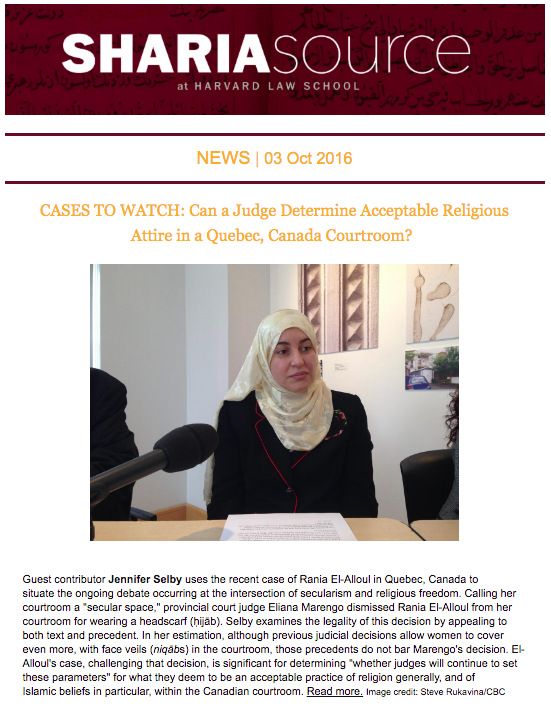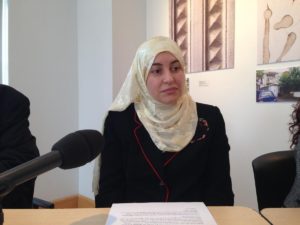
 CASES TO WATCH: Can a Judge Determine Acceptable Religious Attire in a Quebec, Canada Courtroom? Guest contributor Jennifer Selby uses the recent case of Rania El-Alloul in Quebec, Canada to situate the ongoing debate occurring at the intersection of secularism and religious freedom. Calling her courtroom a “secular space,” provincial court judge Eliana Marengo dismissed Rania El-Alloul from her courtroom for wearing a headscarf (ḥijāb). Selby examines the legality of this decision by appealing to both text and precedent. In her estimation, although previous judicial decisions allow women to cover even more, with face veils (niqābs) in the courtroom, those precedents do not bar Marengo’s decision. El-Alloul’s case, challenging that decision, is significant for determining “whether judges will continue to set these parameters” for what they deem to be an acceptable practice of religion generally, and of Islamic beliefs in particular, within the Canadian courtroom. Read more. Image credit: Steve Rukavina/CBC
CASES TO WATCH: Can a Judge Determine Acceptable Religious Attire in a Quebec, Canada Courtroom? Guest contributor Jennifer Selby uses the recent case of Rania El-Alloul in Quebec, Canada to situate the ongoing debate occurring at the intersection of secularism and religious freedom. Calling her courtroom a “secular space,” provincial court judge Eliana Marengo dismissed Rania El-Alloul from her courtroom for wearing a headscarf (ḥijāb). Selby examines the legality of this decision by appealing to both text and precedent. In her estimation, although previous judicial decisions allow women to cover even more, with face veils (niqābs) in the courtroom, those precedents do not bar Marengo’s decision. El-Alloul’s case, challenging that decision, is significant for determining “whether judges will continue to set these parameters” for what they deem to be an acceptable practice of religion generally, and of Islamic beliefs in particular, within the Canadian courtroom. Read more. Image credit: Steve Rukavina/CBC
 CASE: 2012 Judgment on Wearing a Niqab in a Canadian Court (Canadian Supreme Court, 2012) In N.S. and the Queen v. Ontario Human Rights Commission et al, the Canadian Supreme Court, 2012 was asked to determine whether a woman was impermissibly barred from wearing a face veil (niqāb) in court during a sexual assault trial. N.S., as she is referenced in court documents to protect her identity, wore a face veil (niqāb) in her daily life. Chief Justice Beverly McLachlin concluded that the answer, in short, depends. While declining a bright line rule against permitting veil removal or barring it, the Court held that a judge must strike a “just and proportionate balance between freedom of religion and trial fairness, based on the particular case before the court.” The case has since proved to be key in the debate between secularism and religious freedom, showing that the two ideals are not dichotomous. Read more. Image credit: Straight Good News,
CASE: 2012 Judgment on Wearing a Niqab in a Canadian Court (Canadian Supreme Court, 2012) In N.S. and the Queen v. Ontario Human Rights Commission et al, the Canadian Supreme Court, 2012 was asked to determine whether a woman was impermissibly barred from wearing a face veil (niqāb) in court during a sexual assault trial. N.S., as she is referenced in court documents to protect her identity, wore a face veil (niqāb) in her daily life. Chief Justice Beverly McLachlin concluded that the answer, in short, depends. While declining a bright line rule against permitting veil removal or barring it, the Court held that a judge must strike a “just and proportionate balance between freedom of religion and trial fairness, based on the particular case before the court.” The case has since proved to be key in the debate between secularism and religious freedom, showing that the two ideals are not dichotomous. Read more. Image credit: Straight Good News,
 In Summary: SHARIAsource Joins in the Launch of t he Berkman Klein Center for Internet & Society: On Power and Participation in the Networked Public Sphere A stellar line-up of Berkman Klein directors, fellows, former fellows, and project directors formed a panel that discussed avenues for conversation and collaboration on cutting-edge scholarship and technology both within and outside of established distribution mechanisms. Professor Intisar Rabb, SHARIAsource founding editor-in-chief, spoke about her role in and the compelling reasons for forming SHARIAsource, which immediately garnered the support of the Berkman Klein Center in 2014. She pointed to the need for an academic and public understanding of what sharīʿa is and is not. With collaborations facilitated in part by Berkman Klein colleagues, the project has taken up several questions that seek to make academic information on Islamic law accessible and useful to specialists and non-specialists alike: How can we collect sources on Islamic law and organize vast quantities of information in a way that provides a viable research tool on par with U.S. and other legal databases? How can we ensure that the diversity of Islamic law is maintained even as we seek to facilitate scholarly and public engagement about particular pressing problems of the day? How do we help inform academic, policy, and media conversations about Islamic law? Professor Rabb also discussed how a greater understanding of the context and nuance of Islamic law can impact the construction and implementation of law in a diverse number of societies. The event – organized by the Berkman Klein Center to celebrate its renaming with a gift from Michael Klein – attracted approximately 100 people in Wasserstein Hall, including Mr. Klein, and was followed by a reception and dinner at the Harvard Art Museums. Image Credit: SHARIAsource
In Summary: SHARIAsource Joins in the Launch of t he Berkman Klein Center for Internet & Society: On Power and Participation in the Networked Public Sphere A stellar line-up of Berkman Klein directors, fellows, former fellows, and project directors formed a panel that discussed avenues for conversation and collaboration on cutting-edge scholarship and technology both within and outside of established distribution mechanisms. Professor Intisar Rabb, SHARIAsource founding editor-in-chief, spoke about her role in and the compelling reasons for forming SHARIAsource, which immediately garnered the support of the Berkman Klein Center in 2014. She pointed to the need for an academic and public understanding of what sharīʿa is and is not. With collaborations facilitated in part by Berkman Klein colleagues, the project has taken up several questions that seek to make academic information on Islamic law accessible and useful to specialists and non-specialists alike: How can we collect sources on Islamic law and organize vast quantities of information in a way that provides a viable research tool on par with U.S. and other legal databases? How can we ensure that the diversity of Islamic law is maintained even as we seek to facilitate scholarly and public engagement about particular pressing problems of the day? How do we help inform academic, policy, and media conversations about Islamic law? Professor Rabb also discussed how a greater understanding of the context and nuance of Islamic law can impact the construction and implementation of law in a diverse number of societies. The event – organized by the Berkman Klein Center to celebrate its renaming with a gift from Michael Klein – attracted approximately 100 people in Wasserstein Hall, including Mr. Klein, and was followed by a reception and dinner at the Harvard Art Museums. Image Credit: SHARIAsource
See the full newsletter.

